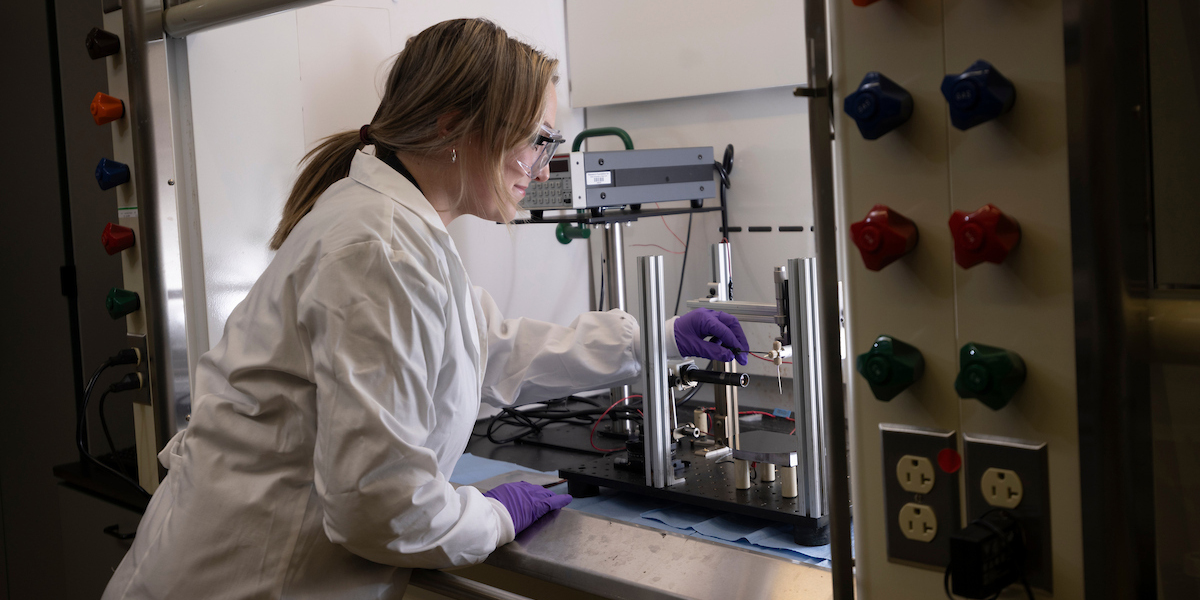Mechanical Engineering Department celebrates 2023-24 successes

As Binghamton University enters the fall semester, the Department of Mechanical Engineering at the Thomas J. Watson College of Engineering and Applied Science is looking back on a productive 2023-24 academic year.
This spring, two ME faculty members were elevated to SUNY distinguished professors: SB Park and Guangwen Zhou. The title is reserved for those who have achieved national or international prominence and exemplary reputations within their disciplines.
Student news
Before earning diplomas, ME undergraduates need to complete senior capstone projects. This year, one team came up with the idea of a “pedal-powered theater” operating on audience participation that would entertain children and generate interest in STEM concepts.
Damian Rode ‘24 spent the summer before his senior year in Munich, Germany, interning at BMW’s Research and Development Center. He worked on numerous projects for one of the world’s largest car manufacturers.
Research news
Using spider silk as a model, Distinguished Professor Ron Miles worked with then-doctoral student, now Assistant Professor Jian Zhou ‘18 on his thesis project. They patented the bio-inspired flow microphone, now commercialized by the Canadian venture firm TandemLaunch and its spinoff company Soundskrit.
Professor Changhong Ke received a $150,000 grant through the National Science Foundation’s Early-concept Grants for Exploratory Research (EAGER) program to find a way to make metals stronger — not weaker — through oxidation. Ke will investigate the potential of building nanotubes into additively manufactured aluminum.
Assistant Professor Rob Wagner is investigating the adaptive response of living rafts made by fire ants to survive flooding. In the Proceedings of the National Academy of Sciences, Wagner and his co-authors investigated how fire ant rafts responded to mechanical load when stretched, and they compared the response of these rafts to dynamic, self-healing polymers.
Assistant Professor Cosan Daskiran and his collaborators received a $607,819 grant from the U.S. Department of Energy to develop, test and establish proof of concept for their integrated tidal desalination system, which creates drinkable water through renewable energy using the rotational power of hydrokinetic turbines rather than electrical energy.
When developing new material laws, recognizing patterns and breaking them down into simple-to-use mathematical formulas can take years — often decades — of experimentation and derivation. Assistant Professor Pu Zhang wants to speed up the material law discovery process with artificial intelligence, and a $294,992 NSF grant will fund his research.
A study in the journal Nature, led by Professor Guangwen Zhou, used transmission electron microscopy (TEM) to peer into the oxide-to-metal transformation at the atomic level. Of particular interest are the mismatch dislocations that are ever-present at the interfaces in multiphase materials and play a key role in dictating structural and functional properties. Collaborators included faculty and staff from the University of Pittsburgh’s Swanson School of Engineering and the U.S. Department of Energy (DOE)’s Brookhaven National Lab.
Faculty news
Associate Professor Scott Schiffres and PhD student Zechen Zhang are helping ChromaNanoTech by analyzing additive manufacturing technology through the Strategic Partnership for Industrial Resurgence (SPIR). Since 1994, New York State has helped fund partnerships at four State University of New York (SUNY) engineering programs — Binghamton, Buffalo, Albany and Stony Brook — that seek solutions to thorny technological problems.
In addition to his elevation to SUNY distinguished professor, SB Park also was honored for his groundbreaking work in electronics packaging when the Institute of Electrical and Electronics Engineers (IEEE) named him a fellow of the organization. The honor puts him among 0.1% of its 427,000-plus membership in more than 190 countries.
Alumni news
The Binghamton University Alumni Association named Gabriel Osei ’21 a winner of the BOLD (Bearcats of the Last Decade) 10 Under 10 Award earlier this year. The award honors alumni who have graduated within the last 10 years, demonstrated a very high level of career achievement since leaving campus, and show great potential for future leadership.
Ghazal Mohsenian, MS ’20, PhD ’22, came to Binghamton University determined to further her education. After graduating from the doctoral program, she was inspired by her various internship positions and secured a permanent spot at Intel Corp. working on semiconductors.

